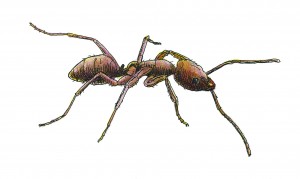READY TO GET STARTED?
REQUEST A FREE ESTIMATE
Fill out the form below or call (888) 466-7849 for a free, no-obligation estimate.
 For years, DEET has been the “go-to” insect repellant recommended by everyone from Doctors to pest control companies. But recently, reports have come out that although they deter insects at first, they learn to ignore it and will go on to bite anyways. Specifically, mosquitoes, are thought to be getting more and more resistant to the substance.
For years, DEET has been the “go-to” insect repellant recommended by everyone from Doctors to pest control companies. But recently, reports have come out that although they deter insects at first, they learn to ignore it and will go on to bite anyways. Specifically, mosquitoes, are thought to be getting more and more resistant to the substance.
It just goes to show how adaptive insects and animals really are. That is why Northwest Exterminating, and other pest control companies, need to constantly be on the cutting edge of technology.
You can read the full article by clicking here.
Humans and pets aren’t the only things getting groomed. Researchers at NC State explain why cockroaches spend so much time in the grooming department. Read below…
Like a self-absorbed teenager, insects spend a lot of time grooming. In a study that delves into the mechanisms behind this common function, North Carolina State University researchers show that insect grooming — specifically, antennal cleaning — removes both environmental pollutants and chemicals produced by the insects themselves.
The findings, published online this week in Proceedings of the National Academy of Sciences, show that grooming helps insects maintain acute olfactory senses that are responsible for a host of functions, including finding food, sensing danger and even locating a suitable mate.
The findings could also explain why certain types of insecticides work more effectively than others.
Insects groom themselves incessantly, so NC State entomologist Coby Schal and post-doctoral researchers Katalin Boroczky and Ayako Wada-Katsumata wanted to explore the functions of this behavior.
Click here to read the entire article.
Source: Science Daily
Most likely the ants that are seen during winter are Argentine ants. These ants don’t have to live in the ground; they can make themselves right at home under structures or in the walls of homes protected from the elements. And just a few feet away is everything they need to survive: water, food and shelter. But just think, if the ants are this bad now, imagine how bad they will be in the summer!

Argentine Ant
Argentine ants can quickly populate into multiple colonies containing many queens and thousands of workers. The ants can travel freely between and within these colonies. Due to their fast growth it makes it difficult to control these ants once they have made their way into a structure. People often panic when they see ants inside their home and spray them with the closest can of bug spray that they can find. This might fix the problem temporarily, however, it is best to have a professional who can properly identify the ants and understand their habits in order to devise a treatment plan that will be most effective.
Argentine ants are constantly looking for food. They love sugary foods like soft drinks and syrups. Once an ant finds a food source, it alerts the other ants to “come and get it.” Before you know it the trashcans, counter tops and cabinets are taken over by ants! But don’t worry; there are ways to combat these guys once they have invaded.
While all these methods can be effective, the best way to battle Argentine ants is to keep them from entering homes in the first place. Homeowners can cut limbs and other vegetation away from homes to prevent easy access. Rake fallen leaves and pine straw away from the home. Seal all cracks and entry points around the home (this will help with energy bills as well). Don’t forget about potted plants; ants can even nest under pots!
Many times, the materials we use to make our landscaping aesthetically pleasing are the very materials that will harbor pests. Mulch is not only a favorite material for homeowners to use, but it is also the preferred nesting material for ants – providing moisture and shelter from the elements. If mulch is used next to a house it should be pulled away from the outside walls. Refrain from over-watering mulched areas and limit the depth of the mulch to just a couple of inches to help keep it more dry. The drier the mulch, the less inviting it is for ants and other insects.
Garbage cans are often stored next to houses and buildings for convenience. It also makes the area more attractive to ants and brings them closer to your home. Garbage should be kept in sealed cans that are stored as far away from the home as possible.
Controlling Argentine ants is a difficult, year-round task, but with proper prevention and the help of your pest control provider, it is possible.
Teresa Womack
[email protected]
Bed bugs are small parasitic insects that feed on the blood of humans and animals, typically while they sleep. Usually, they live within 8 feet of where people sleep but are known to travel up to 100 feet in one night! This is because they can go many months without having to have a meal. When they take a bite, they will leave a small bite mark that, at worst, can cause a serious allergic reaction, but are otherwise not known to be a source of disease.
Unlike their name suggests, bed bugs can be found in houses, apartments, hotels, trains, and even cruise ships. At one time, it was thought that these insects were only an issue in developing countries, but recently they have rapidly spread throughout North America and parts of Europe. They travel through the seams and folds of luggage, overnight bags, clothing, bedding and furniture. Despite what conventional wisdom suggests, the presence of bed bugs does not have to do with lack of cleanliness. Bed bugs go where food can be found.
Bed bug infestation will most likely be spotted after they have already gotten to you. If you see inexplicable bite marks on your body after you wake up, you might want to investigate further. Looking around your sleeping area, you may discover bed bug exoskeletons, a sweet musty order, rusty-colored blood spots and of course, actual bed bugs in the folds of mattresses and sheets.
The treatment and prevention of bed bugs is where Northwest Exterminating comes in. We offer services to rid your home of bed bugs should an infestation occur. If you find that you have encountered these unwelcome bed guests, be sure to contact your nearest service center!
Melissa Brown
[email protected]
Source:
Ever wonder how gardens stayed plush and green without modern pest control techniques? Before exterminating companies existed, many planters relied on a method of organic pest control known as companion planting. Companion planting involves placing plants in your garden that have qualities that deter pests that surround and protect your other plants. For instance, planting certain herbs in your vegetable garden can attract beneficial insects while simultaneously repelling harmful ones.
One pest that likes to frequent gardens is the aphid, otherwise known as plant lice. These tiny insects suck the sap from the plant, taking all the nutrients to keep the plant healthy and living. Sometimes as they are feeding, aphids transmit plant viruses to plants such as potatoes and citrus plants, which can kill the plants. Planting chives, coriander or nasturtium around your plants will discourage infestations by these plants.
Certain plants can keep larger pests out of your garden. For instance, planting lavender not only deter ticks, but also moths and mice. Mice also do not like the smell of daffodils, which can be used as a colorful boarder for an herb garden. Additionally, rabbits do not like the smell of onions, which can be planted alongside peas, beans, lettuce and cabbage. Lastly, sprinkling cayenne pepper on your plants can act as a deterrent for raccoons.
If companion planting still does not do the job of minimizing pest invasions, Northwest Exterminating offers pest control services that not only takes care of pest, but also does it in a green, environmentally friendly way! Northwest offers many services that will protect your plants, home and office environment. We offer more than pest elimination, but also healthier living and working environments. Check out our website for more info at www.callnorthwest.com
Melissa Brown
[email protected]
Sources:
http://gardening.about.com/od/naturalorganiccontrol/a/Companion_2.htm
http://en.wikipedia.org/wiki/Aphid
http://www.naturalnews.com/035853_companion_planting_garden_vegetables.html